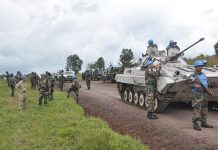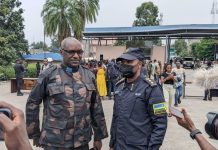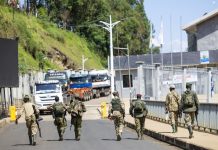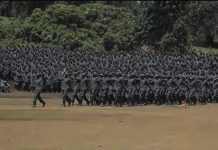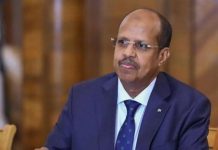Africa-Press – Rwanda. Negotiators of the AFC/M23 movement and the Congolese government are expected to meet in Doha, Qatar, on Monday, October 13, for another round of peace talks, The New Times has learnt.
The Qatar-mediated talks, which have been ongoing since April, hit a stalemate in August after the two parties failed to reach a peace agreement as hostilities resumed in eastern DR Congo.
However, the talk of another round of negotiations comes as fighting continues on the ground in eastern DR Congo, with the rebels accusing the government coalition of carrying out air strikes on their positions and the civilian population.
A spokesperson of the rebel movement that controls key cities in eastern DR Congo said the two parties were preparing to return to the negotiating table but emphasized that meaningful progress would depend on the implementation of previous commitments, including the exchange of prisoners.
“We are looking forward to another round of talks,” Oscar Balinda told The New Times on Tuesday. “However, there can be no meaningful advancement before the implementation of previous agreements on the ceasefire and the release of prisoners.”
The two parties signed a prisoner exchange deal in September, and the International Committee of the Red Cross (ICRC) will monitor its implementation.
Fighting between the AFC/M23 and the Congolese government coalition escalated early this year, as the rebels took control of Goma and Bukavu, the capital cities of North and South Kivu provinces. This followed heavy clashes with the coalition, which included European mercenaries, SADC forces, the Kinshasa-backed Rwandan genocidal militia FDLR, Wazalendo militias, and Burundian forces.
The rebels, who resurfaced in 2021 after nearly a decade of inactivity and are now part of a growing movement, say they are fighting against four main issues with President Felix Tshisekedi’s government. These ethnic divisions targeting Tutsi communities in eastern DR Congo, state failure, illegitimate leadership, and poor governance.
The sticking issues in Doha talks
On July 19, the AFC/M23 and the Congolese government signed a Declaration of Principles in Doha, outlining seven commitments, foremost among them a ceasefire and the mutual release of prisoners and detainees as confidence-building measures.
According to Balinda, the movement has demonstrated good faith by observing unilateral ceasefires and releasing prisoners, but the government has yet to reciprocate.
“From our side, we have released more than 1,400 Congolese soldiers to the International Committee of the Red Cross since late April,” Balinda said. “We also released around 1,500 international forces, including European mercenaries, SAMIDRC, FDLR, and Burundian troops.”
“We were only left with Congolese forces who wished to join and work with us, including those who recently completed commando training and have since integrated into our ranks.” He reiterated.
He further explained that several government soldiers remain in areas under the movement’s control, with ongoing processes aimed at identifying them, facilitating the return of those who wish to reunite with their families, and integrating those who choose to join the rebellion.
In mid-September, the AFC/M23 announced that it had trained some 7,000 commandos, most of whom are former government soldiers. In early October, the movement announced another 9,000 recently trained commandos. The spokesperson said the former government soldiers have chosen to join the ranks of the AFC/M23.
Balinda said the AFC/M23 initiated prisoner releases as early as April and continued through May and June, hoping to encourage reciprocity from Kinshasa. However, he said the Congolese government has refused to release any detained rebels.
“DR Congo has denied the release of our people, who remain in various prisons in Kinshasa and Katanga,” he said. “The file is now in the hands of the ICRC, which is following up to visit, count, and facilitate their release.”
He underscored that the upcoming Doha talks must build upon the previously agreed principles if they are to succeed.
“We are always ready to respond to an invitation from the mediator,” said Balinda, “but there is no sense in holding discussions while the government continues attacking us. They strike every day, mainly through air raids using Sukhoi-25 fighter jets and various drones, including CH-4 and Kamikaze types.”
He maintained that any new discussions must reaffirm the commitments made in the earlier agreements. “The agenda must reflect the agreed ceasefire,” he said. “Without the release of our prisoners, there can be no additional deal. The talks must build on the foundation of the earlier principles.”
Despite the ongoing hostilities, however, Balinda expressed optimism that peace remains attainable in the crisis-hit country.
The absence of confidence-building measures between the two parties leaves the implementation of the July 19 Declaration of Principles effectively paralyzed.
For More News And Analysis About Rwanda Follow Africa-Press


